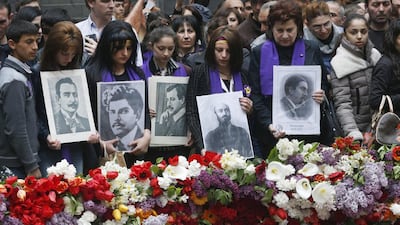YEREVAN // The leaders of France and Russia on Friday joined ceremonies marking the centenary of the massacre of some 1.5 million Armenians by Ottoman forces, a hugely emotional event that still remains a diplomatic minefield.
During a commemoration at a hilltop memorial in the Armenian capital Yerevan, French president Francois Hollande urged modern day Turkey to end its refusal to recognise the massacre as genocide, saying he bowed in memory of the victims.
“Important words have already been said in Turkey, but others are still expected, so that shared grief can become shared destiny,” Mr Hollande told an audience that also included the leaders of Cyprus and Serbia and delegates from some 60 countries.
Russia president Vladimir Putin for his part said Russia was standing shoulder to shoulder with ex-Soviet Armenia, still a close ally for Moscow in the region.
“There is no and cannot be justification for mass murder of people,” Mr Putin said to a standing ovation.
The Russian president appeared to use the ceremony to refer to Ukraine conflict which has pitted Russia against the West, pointing to the rise of “radical nationalists” and Russophobia.
Earlier in the day the leaders, walking in the rain, laid flowers at a memorial commemorating the victims.
Each put a yellow rose at the centre of a wreath resembling a forget-me-not, a flower that has become a symbol of the genocide remembrance.
“I am grateful to all those who are here to once again confirm your commitment to human values, to say that nothing is forgotten, that after 100 years we remember,” Armenian president Serzh Sarkisian told his guests.
But the patchy list of foreign dignitaries attending the commemorations highlighted a lack of international consensus over Armenia’s bid to get the massacres recognised internationally as a genocide.
More than 20 nations — including France and Russia but not the United States — have so far recognised the genocide, a definition supported by numerous historians, but vehemently opposed by Turkey.
On Thursday, the Armenian Church conferred sainthood on the genocide victims in what was believed to be the biggest canonisation service in history.
Turkey, which was born out of the ashes of the Ottoman Empire, has refused to call the slaughter of Christian Armenians genocide. Ankara concedes that up to 500,000 people were killed, but says this was mostly due to fighting and starvation during World War I, especially the struggle between Russia’s empire and the Ottomans.
On Friday, Turkey hosted leaders from the former Allied powers of World War I to pay tribute to the tens of thousands killed in the Battle of Gallipoli, drawing accusations from Armenians that it was deliberately overshadowing the Yerevan ceremonies.
But in a first for a Turkish government minister, European affairs minister Volkan Bozkir attended a Mass at an Armenian church in Istanbul to mark the 1915 massacres, as president Recep Tayyip Erdogan repeated his “condolences” to the victims’ descendants.
In Yerevan, hundreds of thousands joined a procession to the genocide memorial — the country’s most visited landmark — carrying candles and flowers to lay at the eternal flame.
“I hope that the centenary will be a watershed moment in the Armenians’ struggle for the recognition of the genocide,” said Ani Sahakyan, 37, a Yerevan resident.
“I am here to show that Armenians will never forget what happened a century ago,” said Sevan Gedelekian, an ethnic Armenian from Lebanon.
“We demand that Turkey recognise its guilt and make an apology.”
From New York to Paris to Beirut, members of the massive Armenian diaspora that came into existence as a result of the slaughter that went on until 1917 were also to commemorate the anniversary.
About 500 people gathered for a Mass in the Armenian Cathedral of Saint James in Jerusalem, while another 200 people held a rally near the Turkish consulate in East Jerusalem, chanting “Shame on Turkey.”
In Tehran, over 1,000 people protested outside the Turkish embassy, holding placards that read “Recognise Armenian genocide” and “Turkey don’t deny.”
In Bulgaria on Friday, parliament recognised for the first time the mass killings of Armenians but avoided the word genocide.
Germany expected to draw an angry reaction from Turkey after president Joachim Gauck condemned Thursday the massacres as genocide for the first time.
Mr Gauck said that the then German empire — Ottoman Turkey’s ally in World War I — bore “shared responsibility, possibly shared guilt for the genocide.”
Ahead of the anniversary, Turkey kicked up a diplomatic storm, condemning growing “racism” in Europe.
Ankara this week recalled its ambassador to Vienna in response to Austrian lawmakers’ decision to use the genocide word.
US president Barack Obama on Thursday went only so far as to describe the massacres as “terrible carnage”.
This month Ankara recalled its envoy to the Vatican after Pope Francis described the killings as “the first genocide of the 20th century.”
* Agence France-Presse

